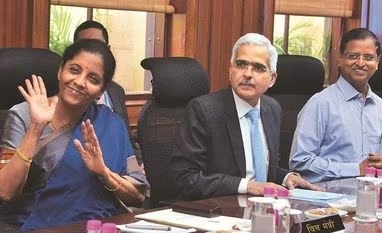“Overall, the system liquidity is in huge surplus since June 1. We have also announced a liquidity back stock for banks to implement the NBFC package announced by the FM in the Budget. We have also decided to frontload the FALLCR, which will infuse additional liquidity,” Das said in a press conference after chairing the customary post-Budget board meeting of the central bank. Finance Minister Nirmala Sitharaman addressed the central board of directors.
In the Budget, the FM announced a one-time six-month partial credit guarantee window to cover up 10 per cent of losses that public sector banks (PSBs) may incur after buying high-rated pooled assets of up to Rs 1 trillion of financially sound NBFCs. “Some measures (related to NBFCs) have been announced by the government. We are monitoring the situation prevailing in NBFCs. I think whatever difficulty was reported earlier related to liquidity has been more than addressed,” Das said. He further said the central bank will provide a backup “if individual banks require additional liquidity.”
“In system, there are so many banks and within individual banks there are some liquidity issues. The RBI will provide liquidity support to them,” the governor said.
Das didn’t give a clear response on whether the RBI was on board the government’s plan to tap markets abroad for borrowings worth $10 million. “The government has made a Budget announcement. We will interact with the government as a debt manager of the government of India and it will be a part of internal deliberations,” he said.
According to sources, MoS Finance Anurag Thakur will hold a meeting with Das to discuss borrowing from external markets next week. “The government is targeting the first tranche of borrowings from abroad in September. There are divided opinions within the RBI. One view is that why open up that option if the borrowing sum is not big at $10 million,” an RBI board member said, requesting anonymity.
Das said the government’s measures to impose additional surcharges will lead to a “marginal increase” in inflation but it will get reflected with a time lag. He said the RBI board will hold a meeting soon to decide the dividend transfers to the government. “The audit committee and the central board will decide based on the finances…We have a broad understanding about how much would come,” he said.
Transfers from the RBI, which have been a point of conflict between the government and the central bank, is budgeted to be around Rs 90,000 crore in the form of dividend for 2019-20, Finance Secretary Subhash Chandra Garg told reporters on Friday. In the receipt Budget, the allocation towards “dividend or surplus of the RBI, nationalised banks and financial institutions” increased by Rs 23,130 crore to Rs 1.06 trillion in 2019-20, compared to the interim Budget.
At the time of interim Budget in February, the government had budgeted Rs 69,000 crore as dividend from the RBI. This means, the government is expecting around Rs 20,000 crore as additional transfers from the RBI.
The RBI governor said the central bank is happy with the Finance Minister’s announcement in the Budget to stick to a “glide path” when it comes to maintaining the fiscal deficit. “RBI will always be happy when the fiscal deficit is maintained and in this case, the fiscal deficit has been improved. RBI will be happy because it completely limits the so-called crowding out effect. This is something positive as it gives more space for private sector borrowing,” Das said, adding that it will be good for macroeconomic situation.
Das termed the Budget’s move to infuse Rs 70,000 capital into PSBs, in the form of recapitalisation bonds, as a “positive development”, which will enable the lenders to meet the regulatory capital needs and step up lending.
To read the full story, Subscribe Now at just Rs 249 a month
Already a subscriber? Log in
Subscribe To BS Premium
₹249
Renews automatically
₹1699₹1999
Opt for auto renewal and save Rs. 300 Renews automatically
₹1999
What you get on BS Premium?
-
Unlock 30+ premium stories daily hand-picked by our editors, across devices on browser and app.
-
Pick your 5 favourite companies, get a daily email with all news updates on them.
Full access to our intuitive epaper - clip, save, share articles from any device; newspaper archives from 2006.
Preferential invites to Business Standard events.
Curated newsletters on markets, personal finance, policy & politics, start-ups, technology, and more.
Need More Information - write to us at assist@bsmail.in
)